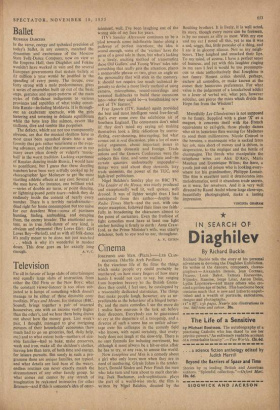Television
I'm all in favour of large slabs of entertainment and equally large slabs of instruction, from either the Old Firm or the New Boys; what the constant viewer-listener is too often sub- jected to is lumps of something which doesn't manage to be either of these desirable com- modities. Ways and Means, for instance (BBC. Sound), brings together a pair of assorted housewives, one with an income vastly higher than the other's, and we hear them being drawn out about how the money goes, Last week's pair, I thought, managed to give intriguing pictures of their households' economies (how much had to go on groceries, fuel, daily help, etc.) and to what extent both—mothers of size- able families—had to bake, make preserves, wash and iron, make all the children's clothes, leaving less than zero, of both time and energy, for leisure pursuits. But surely in such a pro- gramme these are unique families, not typical, and what details are laid bare of the •weary, endless routines can never exactly match the circumstances of any other family group. So what comes out cannot by any stretch of Imagination be reckoned instructive for other Ilsteners—and if this is someone's idea of enter-
tainment, well, I've been laughing out of the wrong side of my face for years.
ITV's Sunday Afternoon continues to be a plod towards some indefinable limbo along a pathway of perfect intentions; the idea is sound enough, some of the 'victims' have the germ of a good tale in them, but what's lacking is a lively, exciting method of transmuting these Old Gaffers' and Young Wives' tales into something that really gets the attention, plants a memorable phrase or two, gives an angle on the personality that will stick in the memory. It should not require too much technical in- genuity to devise a more lively method of using camera, microphone, sound-recordings and screened flashbacks to build these occasions into—what they could be—a breathtaking new sort of TV feature.- Free Speech (ITV, Sunday) again provided the best and most intelligent vocal free-for-all that's ever come over the salubrious air of Southern England. The contestants don't mind (if they don't mind my saying so) making themselves look a little ridiculous by contra- dicting, over-shouting, interrupting; but what comes out is real discussion, plus a lot of mere noisy argument, about important issues in politics both domestic and foreign. Trade unions and the Geneva Conference were the subjects this time, and some realistic and—in certain quarters undoubtedly unpopular— things were said about shop stewards, lazy trade unionists, the power of the TUC, and high-level politicians.
Nigel Balchin's Sunday play on BBC TV, The Leader of the House, was nicely produced and exceptionally well lit, well spoken, well dressed. It was of lighter weight than I had anticipated from this author—despite the Radio Times blurb—and the cast, with one major exception, followed their lines too faith- fully in broadening the characters almost to the point of caricature. Even the frothiest of light comedies must have at least one light anchor holding it firmly to earth: Anne Craw- ford, as the Prime Minister's wife, was utterly delicious, both to eye and to ear, throughout.
A. V. COTON










































































 Previous page
Previous page